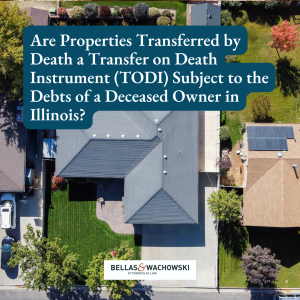 Transfer on Death Instruments, or TODIs, have become a popular estate planning tool in Illinois. They allow real estate to pass directly to named beneficiaries when the property owner dies, all without the need for probate. But what happens if the deceased
Transfer on Death Instruments, or TODIs, have become a popular estate planning tool in Illinois. They allow real estate to pass directly to named beneficiaries when the property owner dies, all without the need for probate. But what happens if the deceased
owner had unpaid debts and the property transferred through the TODI is the only substantial asset? Can creditors go after the property? Do beneficiaries have to pay off those debts? Under Illinois law, the answer isn’t as simple as many assume.
A TODI is a legal document that enables a property owner to designate someone to receive real estate automatically at death. It’s similar to naming a beneficiary on a bank account or life insurance policy, but it applies to real property, often a primary residence.
Because the transfer bypasses probate, many people mistakenly believe the property is also shielded from any debts the decedent may have owed. In reality, that’s not entirely the case.
Illinois law makes it clear that real estate transferred through a TODI is still subject to the debts of the deceased owner. While the property may not go through probate, it does not escape the reach of creditors. If the estate lacks sufficient assets to pay off
valid debts, creditors can file claims to recover from the TODI property. In some cases, the beneficiary may have to cover those debts from the value of the inherited property, or the property itself could be subject to a lien or forced sale to satisfy outstanding
obligations.
This can come as an unpleasant surprise to beneficiaries who were unaware that inherited property could still be exposed to the decedent’s financial liabilities. If the property was the only major asset left behind, creditors may have no other place to turn.
For individuals who inherit property through a TODI, it’s wise to proceed with caution. Selling or transferring the property immediately may not be a good idea if creditor claims are still pending. Consulting with an estate or real estate attorney can help determine whether the estate is solvent and whether any debts need to be addressed. In cases where the estate cannot cover outstanding liabilities, the beneficiary may ultimately be responsible for satisfying certain claims tied to the property.
For property owners considering the use of a TODI, it’s important to understand its limitations. While it offers a streamlined way to pass on real estate, it does not protect the property from creditors. If your home or other real estate is your only significant
asset, you may want to work with an estate planning attorney to explore other strategies that could better protect your beneficiaries.
If you’ve inherited property through a TODI or are considering using one as part of your estate plan, Bellas & Wachowski Attorneys at Law can help you navigate the legal and financial implications. Contact us at (847) 823-9030 for personalized advice on
Illinois real estate and estate planning.
 Chicago Business Attorney Blog
Chicago Business Attorney Blog

